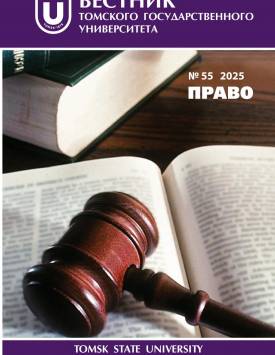Victim advocacy: the narrative context
The author provides statistical information on the crime rate in 2023 and in the first half of2024. Attention is drawn to the number of victims of crime: the number of deaths and those who suffered serious harm to health. It is noted that in some regions of the North Caucasus Federal District there is a positive trend towards a decrease in the number of such victims. The article analyses the provisions of criminal, criminal-procedural and criminal-executive legislation, in which the figure of the victim is mentioned. On the example of article 107 of the Criminal Code of the Russian Federation the influence of the figure of the victim and his behaviour on the qualification is studied. Special attention is paid to the analysis of such aggravating circumstance as unlawfulness or immorality of the victim's behaviour, which was the reason for the crime (paragraph ‘h’ of part 1 of article 61 of the Criminal Code of the Russian Federation). It is concluded that the courts, when making a decision in a criminal case, pay attention to the need to substantiate the absence or presence of an aggravating circumstance, which was pointed out by the participants in the process during the trial, which reduces the likelihood of revision of the sentence. The peculiarities of taking into account such mitigating circumstances as ‘the guilty party's apology to the victim and/or the victim's close relatives’, as well as ‘the young age of the guilty party’ are separately studied. The judgement is considered, in which the court, despite a motion to terminate the criminal case against the defendant due to reconciliation with the victim, decided that the criminal case could not be terminated on the basis of article 76 of the Criminal Code of the Russian Federation. It is noted that in this case the court acted in the interests of the victims themselves. The main regularities are highlighted, which were revealed through the study of materials of criminal cases, verdicts, claims for compensation for damage caused by the crime, as well as complaints filed with the Constitutional Court of the Russian Federation. The problem related to the participation of a lawyer in criminal proceedings on the side of the victim, whose interests he represents, is investigated separately. Narrative stories (interviews) of investigators that reflect violations of the private interests of victims of crime are analysed. It is stated that violations of victims' rights are observed not only at the stage of preliminary investigation or consideration of cases by the courts, but also at the stage of execution of the sentence imposed on the convicted person. The author declares no conflicts of interests.
Keywords
victim, civil action, narrative stories, narrative interviewAuthors
| Name | Organization | |
| Agabekyan Alla L. | Tomsk State University | AllaAgabekyan@yandex.ru |
References

Victim advocacy: the narrative context | Tomsk State University Journal of Law. 2025. № 55. DOI: 10.17223/22253513/55/1
